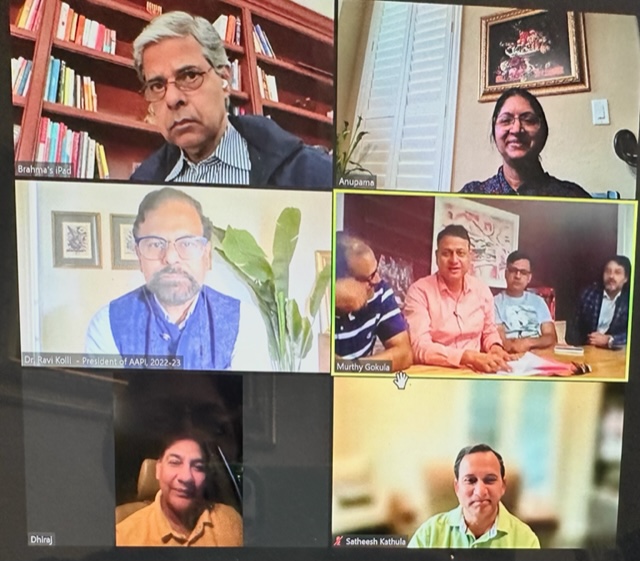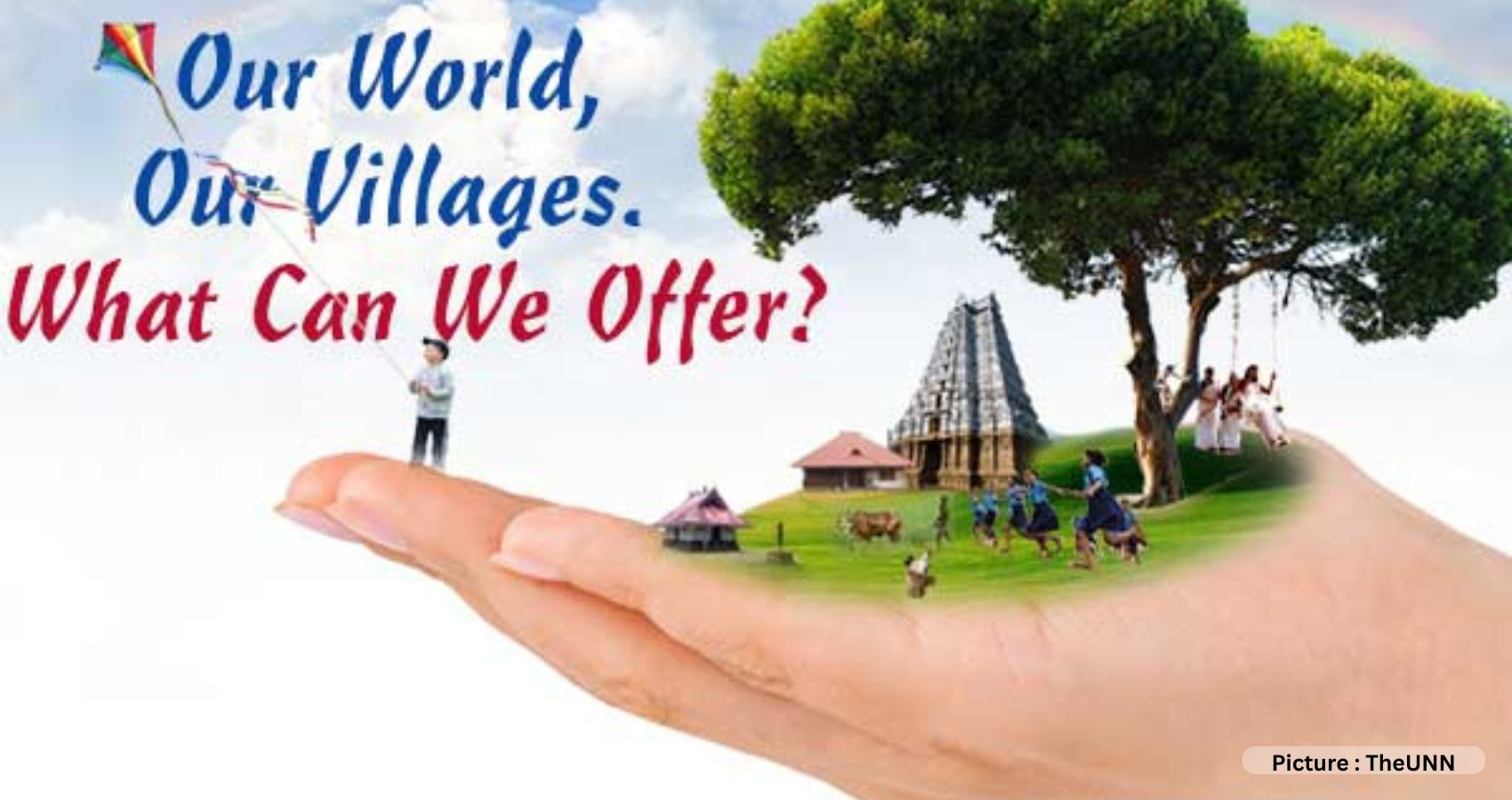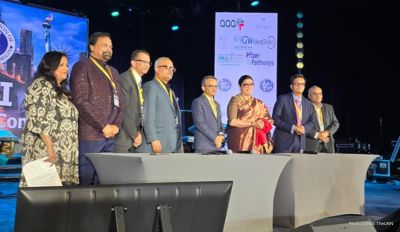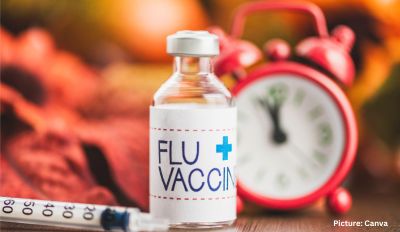“Continuing the excellent efforts to help their motherland by the members of the American Association of Physicians of Indian Origin (AAPI), building on the successful program, ADOPT-A-VILLAGE with the goal of adopting 75 Villages in India, commemorating India’s 75th Independence Day, AAPI has signed a Memorandum of Understanding with Doctors of Rajasthan International (DORI) to carry out screenings in five villages initially in the state of Rajasthan, and hoping to have several additional villages,” Dr. Ravi Kolli, President of AAPI announced here today.
Present during the MOU signing ceremony were prominent DORI members from across the globe, including Drs. Jaivir Rathore, Brahma Sharma, Ranvir Singh Rathore, AAPI EC including Drs. Ravi Kolli, Anupama Gotimukula, Satheesh Kathula, and President and CEO of GTC, Dr. Radha Ramana Murthy Gokula.
While India has made substantial progress in health care as evidenced by the fact that life expectancy in India at birth now is 71 years as opposed to 58 years in 1990 and 41 years in 1960, there are significant gaps and divergences in health metrics in different regions in India.

India needs to redouble and continue its efforts and dedicate resources to tackle these perennial challenges. The post-graduate training of physicians specializing in Family Medicine in every teaching institution will create motivated and well-trained family physicians to address these deficits and deliver accessible, affordable, economical, and continuous preventive and primary care to rural as well as urban poor populations to raise health outcomes across India.
Realizing the need to bridge this gap, AAPI has launched this much-needed and popular ADOPT-A-Village Program, chaired by, Dr. Satheesh Kathula, the current Vice President of AAPI. while Dr. Anupama Gotimukula, Dr. Jagan Ailinani and Dr. Murthy Gokula serve as members of the Committee.
AAPI has embarked on free screening for NCDs in 75 villages to commemorate 75 years of India’s independence. The screening tests include CBC, HbA1C, lipid profile, creatinine, pulse oximetry, measurement of blood pressure, height, and weight.
To date, through the efforts of AAPI and its local organizers in these states, over 8,0000 patients in several states across India including Andhra Pradesh, Gujarat, Himachal Pradesh, Jharkhand, Karnataka, and Telangana have been screened. Now with an MOU Rajasthan, people in this state will have an opportunity to screen a few thousand more in rural India.
AAPI initiated the Digital Integrated Prevention And Management Program (DIPAM), a Rural Health Initiative in India in a virtual launch event on Gandhi Jayanthi on October 2nd, 2022. The data collected from the screenings has been very interesting which will help the Health Officials in India establish a preventive health task force in India. AAPI in partnership with Global Teleclinics (GTC) is currently working on a Digital Integrated Prevention and Management (DIPAM) program with the vision of raising awareness of disease management and reversal of NCDs to improve healthcare outcomes by connecting rural India with medical providers and other partners.
Dr. Anupama Gotimukula, Immediate Past President of AAPI referred to the goals of Adopt-A-Village. “As India celebrates her 75th anniversary of Independence Day, AAPI has been working on adopting 75 villages across India in several states, where the rural people of India are being offered ‘Free Health Screenings in 75 Villages, for Anemia (CBC), DM (HbA1C), High Cholesterol, CKD, Malnutrition, Obesity, and Hypoxemia. Results are being analyzed by GTC, and further treatment plans are recommended by their team of experts with follow-ups. This is a small contribution by AAPI to Mother India in celebration of Azadi Ka Amrut Mahotsav.”
Dr. Satheesh Kathula, Chairman of AAPI’s Adopt a Village Program pointed out the need for this noble initiative. He said, “India has nearly 700,000 villages, where 77 percent of the poor live. The majority of the population has no access to basics such as safe drinking water and healthcare. “By adopting one village at a time and working with the government and NGOs, NRIs can make a huge difference,” he said.
Dr. Kathula referred to the rural initiative as “A much-needed project to prevent silent killers such as Hypertension, diabetes, Hypercholesterolemia, and chronic kidney disease. Adopt A Village program also helped rural India with the supply of cloth masks, and clean drinking water and has helped thousands of people across India. We are excited about providing continuous healthcare in India with DIPAM.”
Dr. Brahma Sharma said, “By adopting one village at a time and working with the government and NGOs, NRIs can make a huge difference in the lives of millions of people in India. Each project will involve a tripartite partnership between the NRI, state government, and a local NGO.”
Dr. Murthy Gokula, President of Global Teleclinics said, “Adopt-A-Village is a great opportunity to enhance the effectiveness of telehealth through awareness, education, and sustainable development in all villages.”
The project is aimed at bringing Non-Communicable Diseases (NCDs) screening and prevention to rural people at their doorsteps of India and raising awareness of disease management and reversal of Non-Communicable Diseases to improve health outcomes and connect rural India with medical providers and partners.
Initially launched with the goal to adopt and screen 75 villages for: Hypertension, Diabetes, Anemia, Chronic Kidney disease, and Hyperlipidemia, the phase 2 project aims at providing: in person complete physical exam for positive NCD patients every 3 months; Giving 3-month medications for the identified illnesses; Daily teleclinic through the app-based solution; Communication with the villagers through WhatsApp or telephone; Access to a local health care worker hired by global teleclinics for daily interaction and emergencies; and, Utilize local medical resources: RMPs, PHC personnel for immediate care,
While there is no instant solution for rural India’s myriad problems, by adopting one village at a time, and working with the government and NGOs, NRIs can make a difference, and over time, an improved village could lead to an improved region, state, and country.
Dr. Kolli thanked the AAPI members for their generous support of this noble work of AAPI and for sponsoring their ancestral villages. Dr. Kolli urged “AAPI members to consider joining this movement and adopt a village. Maybe your own village of origin. AAPI will work with you in coordinating the efforts and through the support system we have in several states, will help you achieve this goal of giving back to our motherland.” AAPI members/families can sponsor a Village by emailing: [email protected] and [email protected]. For more details, please visit www. aapiusa.org











